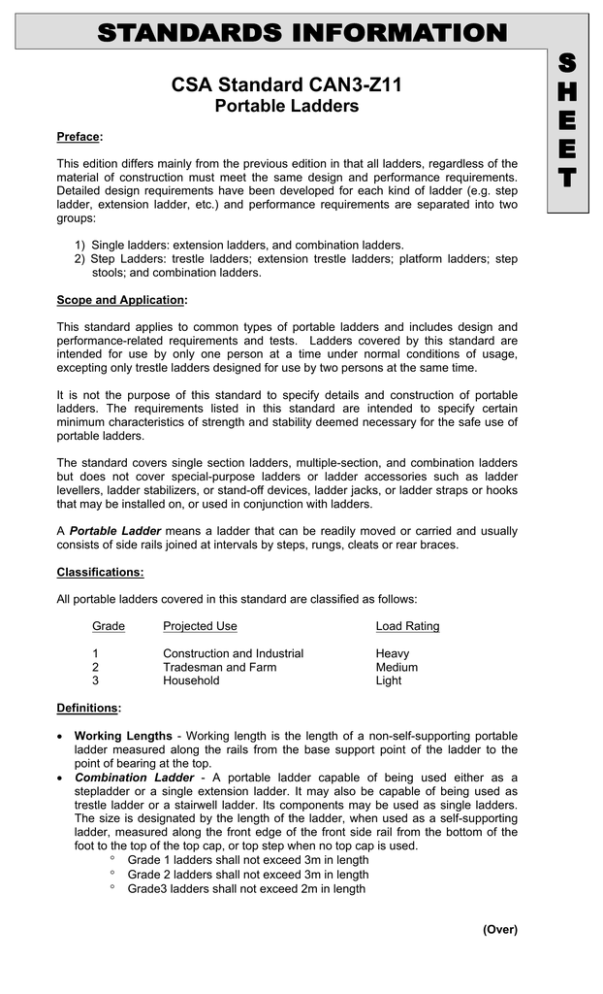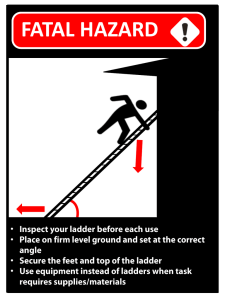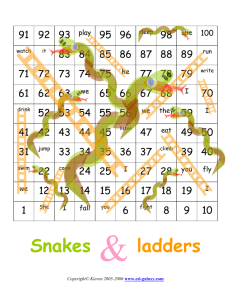CSA Standard CAN3-Z11
advertisement

CSA Standard CAN3-Z11 Portable Ladders Preface: This edition differs mainly from the previous edition in that all ladders, regardless of the material of construction must meet the same design and performance requirements. Detailed design requirements have been developed for each kind of ladder (e.g. step ladder, extension ladder, etc.) and performance requirements are separated into two groups: 1) Single ladders: extension ladders, and combination ladders. 2) Step Ladders: trestle ladders; extension trestle ladders; platform ladders; step stools; and combination ladders. Scope and Application: This standard applies to common types of portable ladders and includes design and performance-related requirements and tests. Ladders covered by this standard are intended for use by only one person at a time under normal conditions of usage, excepting only trestle ladders designed for use by two persons at the same time. It is not the purpose of this standard to specify details and construction of portable ladders. The requirements listed in this standard are intended to specify certain minimum characteristics of strength and stability deemed necessary for the safe use of portable ladders. The standard covers single section ladders, multiple-section, and combination ladders but does not cover special-purpose ladders or ladder accessories such as ladder levellers, ladder stabilizers, or stand-off devices, ladder jacks, or ladder straps or hooks that may be installed on, or used in conjunction with ladders. A Portable Ladder means a ladder that can be readily moved or carried and usually consists of side rails joined at intervals by steps, rungs, cleats or rear braces. Classifications: All portable ladders covered in this standard are classified as follows: Grade Projected Use Load Rating 1 2 3 Construction and Industrial Tradesman and Farm Household Heavy Medium Light Definitions: • • Working Lengths - Working length is the length of a non-self-supporting portable ladder measured along the rails from the base support point of the ladder to the point of bearing at the top. Combination Ladder - A portable ladder capable of being used either as a stepladder or a single extension ladder. It may also be capable of being used as trestle ladder or a stairwell ladder. Its components may be used as single ladders. The size is designated by the length of the ladder, when used as a self-supporting ladder, measured along the front edge of the front side rail from the bottom of the foot to the top of the top cap, or top step when no top cap is used. ° Grade 1 ladders shall not exceed 3m in length ° Grade 2 ladders shall not exceed 3m in length ° Grade3 ladders shall not exceed 2m in length (Over) (cont’d) • • • • • • • • • • Combination ladders shall be set up in such a manner that the ladder, when used as extension ladder, shall not exceed the maximum working lengths specified by the manufacturer. Designs employing ladder lock location, mechanical stops, or equivalent, are acceptable. Extension Ladder - A non-self-supporting portable ladder consisting of two or more sections travelling in interlocking rails, guides, or brackets so arranged to permit length adjustment. ° Grade 1 – not to exceed 18m in length for two sections or 22m for three sections ° Grade 2 – not to exceed 15m in length for two sections or 18m for three sections ° Grade 3 – not to exceed 9.5m in two sections Extension Trestle Ladder - A self-supporting portable ladder, adjustable in length, consisting of a trestle ladder base and a vertically adjustable section, with suitable means for locking ladders together. The size is designated by the length of the trestle ladder base along the front edge of the side rail including the shoe. In no case shall the extension section size exceed the base section size. Platform Ladder - A self-supporting portable ladder of fixed size with a platform provided at the intended highest standing level. The size of a platform ladder is designated by the length of the front edge of the front side rail, including any foot or shoe. ° Grade 1 ladders shall not exceed 6m in length ° Grade 2 ladders shall not exceed 3.6m in length ° Grade 3 ladders shall not exceed 1.8m in length Reinforced Plastic Ladder - A portable ladder whose side rails are constructed of reinforced plastic (fibreglass). The steps, rungs, cleats, hardware, and fasteners may be constructed of metal, reinforced plastic, or other suitable materials. Sectional Ladder - A non-self-supporting portable ladder, non-adjustable in length, consisting of two or more sections, so constructed that the sections may be combined to function as a single ladder. Single Ladder - A non-self-supporting ladder, non adjustable in length, consisting of one section only. Single ladders may be step or rung type. ° Grade 1 ladders shall not exceed 9m ° Grade 2 ladders shall not exceed 7.5m ° Grade 3 ladders shall not exceed 5m Special- Purpose Ladder - A ladder that represents either a modification or a combination of design or construction features in one of the general-purpose ladders herein defined, in order to adapt to special or specific uses. Step Ladder - A self-supporting portable ladder, non-adjustable in length, having flat steps and hinged back. The back section consists of either a single ladder or other supporting device. Step Stool - A self-supporting, fixed or foldable, portable ladder non-adjustable in length; 800mm – 32in or less in overall size with flat steps and without a pail shelf. The ladder top cap is designed to be climbed on as well as all steps. The side rails may continue above the top cap. The size is measured along the front edge of the front side rail including the top cap and feet. The front side rails may continue around and over the top cap, but such side rail extension is not considered part of its size. Trestle Ladder - A self supporting portable ladder, non-adjustable in length, consisting of two sections, hinged at the top to form equal angles with the base. The size of trestle ladders or extension sections or base sections of extension trestle ladders shall not exceed 6m in length. This bulletin contains a summary of excerpts taken from the Standard, for general information purposes only. This bulletin is not reflective of the complete requirements that the Standard prescribes. Note: Manitoba Regulation M.R. 217/2006 Section 1.4 inconsistency: If there is an inconsistency between this regulation and a requirement contained in a publication, code or standard referenced in this regulation, the provisions in this regulation prevail.


